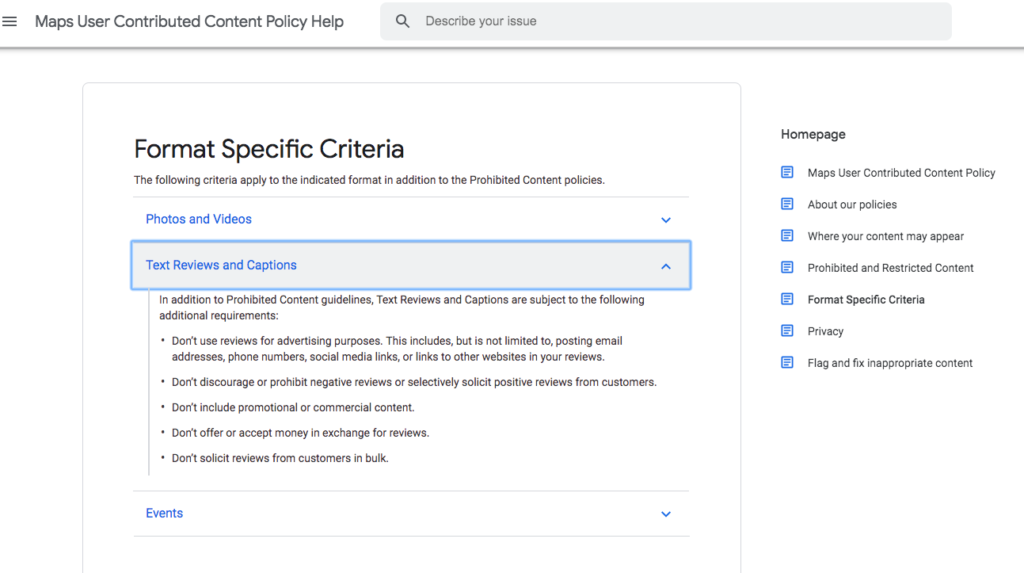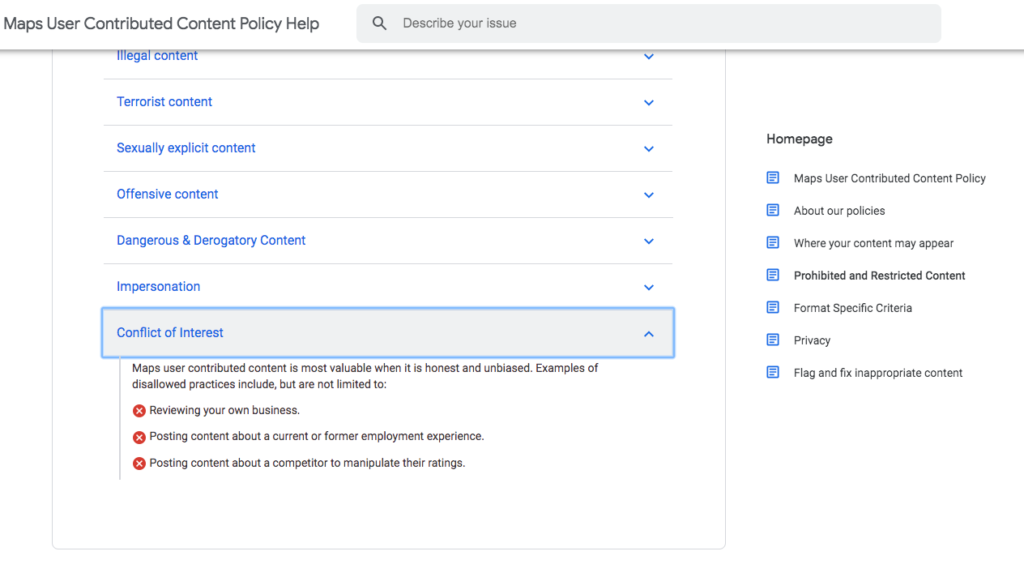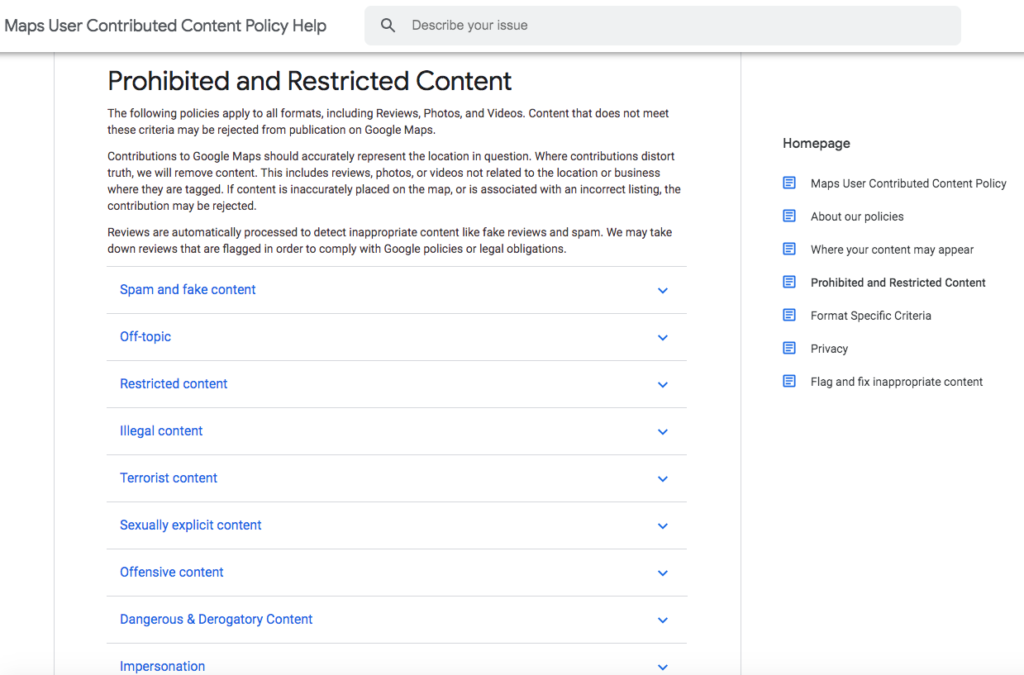Google is the number one site where consumers go to read and write reviews. To find out if your business is worth a visit, many prospective customers turn to Google reviews. In this blog, we share everything you need to know about Google review policies. Keep in mind that Google can update the policies and guidelines at any time. We updated this blog in 2023 to include the most up-to-date information.
Please note: this blog post is not comprehensive, nor is it legal advice. Review Google’s policies and terms of service thoroughly, and consult with a lawyer if you have questions.
Google Review Policy: What Business Owners Can and Can’t Do to Get More Reviews
Google review policies are located under the Maps User Contributed Content Policy since reviews are submitted and edited using the Google Maps tool. Many of these policies are explicit about what is allowed in a business review, who can make them, and what businesses can do if they don’t meet these policies.
In general, Google review policies are simple; the reviews should be honest and polite. However, since Google reviews are often brief, there is room for interpretation. Here is a breakdown of the essential policies and guidelines for Google reviews. We’ll discuss these and others in more detail later in the post.
- Can I ask customers for reviews? Yes, you can ask customers to submit reviews, but Google review guidelines forbid “soliciting reviews from customers in bulk.”
- Can I stop customers from writing bad reviews? No, Google review policies expressly forbid “selectively solicit(ing) positive reviews from customers.”
- Can I pay customers for reviews? No, Google and most other review sites state in their terms of service that paying for reviews is not allowed.
- Can employees post reviews? No, the Google review policy prohibits reviewing your own business as it causes a conflict of interest.
- Will Google delete a fake review? Google uses automated spam detection to remove reviews that are likely spam. However, if you find a review that violates Google’s policies, you should flag the review.
- What are the consequences of not following Google review policies? Google can remove reviews and ban users or businesses from their services.
Featured Resource: Google Review Link Generator
Get your Google Review Link + Google Review Resources for Business Owners
Can I Ask For Google Reviews?

Yes, it is within the Google review policies to ask for reviews or “solicit reviews.” In fact, this is often the best way—after all, your happy customers don’t know you’re looking for reviews unless you tell them. However, there are some rules about asking for reviews.
In the Format Specific Criteria section of Google’s review guidelines, you’ll find the following under Text Reviews and Captions:
“Don’t solicit reviews from customers in bulk.”
When asking for Google reviews, it’s best to ask with a goal or purpose in mind. This means you should be conscious of who you are messaging, why, and how frequently. For example, you might use automated messaging to ask a customer to write a review after they’ve used your product or service for a set amount of time. Though this message is automated and will save you time, it is not necessarily soliciting reviews “in bulk.”
If you are active on social media, you might also ask for reviews there. Though this is a request any of your followers could see, you haven’t sent the request directly to them, so this is unlikely to be considered “soliciting in bulk.” You might use a similar strategy at a kiosk in your store or use your Google review URL at the bottom of receipts. If you’re unsure how this Google review guideline applies to your strategy, consider consulting with a legal expert, or ask the Google Community.
How to Ask for Google Reviews
Though it’s unwise to solicit Google reviews from customers in bulk, there are a few strategies you can use to point customers in the right direction. First, as previously mentioned, have a reason and purpose in mind. Second, be honest about what a review means for your business. Finally, make it as easy as possible for a customer to leave a review.
To ask for a Google review while still working within Google guidelines, consider the following:
- If you regularly sit down with customers, you might ask for a review when you meet.
- When you follow up to ask about your customer’s experience with your business, suggest that they put their thoughts in a review.
- Emphasize that reviews help other customers find what they’re looking for and help your business improve.
- Ask for a review on your social media, including Facebook, Instagram, LinkedIn, or somewhere else.
- Use a chalkboard, menu, or another area customers are sure to see and suggest that customers review their experience in your store.
- When you ship your products, use a note or sticker to ask for a Google review.
- Make sure it is easy to leave a review. Use the Google Review Link Generator to get your link, so customers don’t have to hunt down your Google listing.
Featured Resource: Google Review Link Generator
Get your Google Review Link + Google Review Resources for Business Owners
Can I Ask Only Happy Customers to Submit a Google Review?
No, you cannot ask only happy customers to submit a Google review. Google updated its review policies in 2018 to forbid the practice of “review gating.” The policy itself states:
“Don’t discourage or prohibit negative reviews or selectively solicit positive reviews from customers.”
This means all of your customers should have equal opportunities to leave a review. While this prospect can be intimidating, remember to respond to negative reviews and resolve issues your customers encounter. Customers can update their reviews at any time, and you can flag abusive reviews (which we will cover later in the post).
How Do I Respond to a Negative Review?
All of your customers should have an equal opportunity to leave a review if they choose. However, an unhappy customer’s priority might be to resolve a problem, not to leave a review. As you solicit reviews from your customers, you might also provide a contact number as an option to talk with someone before leaving a negative review. This way, you can avoid negative reviews without breaking Google’s review guidelines.
If you do encounter a negative review on Google—you almost certainly will at some point—remember that even negative reviews can serve a purpose. Sometimes, the reviewer is just not the right customer. For example, someone looking for a cozy, traditional sit-down restaurant might not like a trendy new fusion restaurant. They might leave a negative review, but they weren’t the restaurant’s target audience. Or, a negative review might point out a problem you’re not aware of, which gives you a chance to fix it.
Try not to take negative reviews personally. Respond to the review, and thank the customer for taking the time to write a review. If the customer noted a problem, address it. Respond to reasonable reviews and inform the reviewer that you’ve solved the problem, or explain the problem further. If a review isn’t reasonable, or it is especially scathing, don’t engage on an emotional level. Your calm response will show even more composure and patience next to an angry and unreasonable review.
Can I Offer Rewards or Money For Google Reviews?
No, you cannot offer money or other rewards for Google reviews. Google and most other review sites prohibit the use of money, discounts, gifts, or other rewards for reviews. For Google’s review policies, the exact wording is quite simple;
“Don’t offer or accept money in exchange for reviews.”
Though this doesn’t mention giveaways or gifts, Google has taken action against businesses that incentivize reviews this way. It’s probably best to be cautious here, or any reviews you incentive might be removed. The best request you can make to your customers is an honest one. Explain, briefly, that reviews are vital to your business and you value your customers’ input. For many people, the prospect of helping someone, especially someone who provided a good experience, is a greater reward than a discount or gift card.
While you might still use rewards to gather reviews or testimonials for your site or promotional documents, Federal Trade Commission (FTC) rules on reviews and testimonials explain there should be a disclaimer for these reviews.
Can I Get an AI to Write Reviews for Me?
Google expressly forbids writing fake reviews or incentivizing reviews, so this means reviews written by artificial intelligence are also out. Though AI has now stated to write reviews in some circumstances, all review sites, including Google, forbid this practice.
There are a variety of reasons why Google and other review sites don’t allow AI reviews on their sites. First, there’s no way that an AI could’ve used your product or tried your business. Therefore, the review is inherently dishonest. It’s also fake, since it isn’t made by a real person. Just like paying for reviews or getting someone to write fake reviews, this isn’t a good practice to start.
Many sites, including Google and Amazon, are actually using AI to detect reviews written by AI programs. These programs examine the content of the review, the relationships between reviews, reviewers, and businesses, the timing of the review, and other factors to determine whether a review was AI-generated. In fact, Google recently removed over 75 million fake, offensive and misleading reviews using this practice.
Can I Ask Employees to Review My Business?

No, you cannot ask employees to review your business. This falls under the Conflict of Interest section of the Google review policies. Specifically, this Google review guideline states;
“Maps user contributed content is most valuable when it is honest and unbiased. Examples of disallowed practices include, but are not limited to:
- Reviewing your own business.
- Posting content about a current or former employment experience.
- Posting content about a competitor to manipulate their ratings.”
While your current or former employees might offer valuable insights about your business, they don’t represent a typical customer, so their input isn’t suitable for a Google review. Moreover, a current or former employee is likely biased. The FTC calls this a “material relationship” and also forbids these types of reviews.
What If a “Customer” Posts a Fake Review?
In some cases, you may find that someone posted a review that is completely false or goes against the Google review policies. This is considered a fake review and is prohibited. You can begin by flagging the review as inappropriate. This will bring the review to Google’s attention, but it may take them several days to respond. Follow these steps to flag a review:
- Log into Google My Business.
- Select the location (if applicable)
- In the menu, select “Reviews”
- Find the review in question. Click the three-dot menu, then select “Flag as inappropriate.”
After you flag the review, you should also respond and calmly state that the review is fake and refute any false claims. While this probably won’t get the review removed, it will show other customers that they should not trust the review. If you have reason to believe the reviewer has written fake reviews for other businesses, collect your evidence and appeal directly to Google review moderators.
Google does have an automated spam detection process to limit the number of spam reviews that get published. However, it is not always perfect and may miss some or may even remove legitimate reviews. In either case, be sure to monitor your Google reviews regularly.
Featured Resource: Google Review Link Generator
Get your Google Review Link + Google Review Resources for Business Owners
What if a Review is Abusive?

If a review is abusive or otherwise inappropriate, you should flag it.
Google has a long list of content that is not allowed in a review or anywhere else. This includes content alluding to illegal activities or content that is especially offensive or inappropriate. Some of these review guidelines include:
We will remove content that contains obscene, profane, or offensive language or gestures.
We don’t accept content that is illegal or depicts illegal activity.
Google Maps is a place for safe communications between users. For this reason, we don’t permit merchants or consumers to post dangerous or derogatory content…
Keep in mind reviews might be harsh or even unnecessarily cruel without being abusive or obscene. However, if a reviewer uses offensive language, sexual language, threats, slurs, calls for violence, or alludes to illegal activity, you should flag it. Since it is clear in the content of the review that it is inappropriate, these are more likely to be removed than fake reviews.
Can I Copy Google Reviews to My Own Site?

No, you cannot use Google reviews on your own site. The reviews posted to Google are considered the intellectual property of Google and the original poster. This means copying them for your advertisements or marketing products is copyright infringement. This is true for most, if not all, other review sites as well.
Copying and pasting content that someone else has written violates U.S. copyright laws in general. This rule is also outlined under the general Terms of Service for Google Maps. It states under the Prohibited Content section:
When using Google Maps/Google Earth, you may not (or allow those acting on your behalf to):
redistribute or sell any part of Google Maps/Google Earth or create a new product or service based on Google Maps/Google Earth…
copy the content…
Google makes some exceptions for developers, embedding Maps into other websites, educational purposes, and certain other uses, but makes no exceptions that mention reviews. Even if Google allowed copying and pasting reviews, the content also belongs to the original poster, who might disapprove of their review being used in other materials.
How Do I Get More Google Reviews?
Now that you know what you can and can’t do to get reviews according to Google’s review policies, here are a few tips to help stay within these review guidelines.
- When asking for Google reviews, make an honest request and state your customers’ input is valuable.
- It’s helpful to arrange review requests around particular events, such as when a customer uses a product or service for a particular amount of time or perhaps when they make a repeat purchase or visit.
- Use your Google review link so customers can post reviews in just one click, and they don’t have to hunt for your business.
- Use your Google review link liberally; at the bottom of your receipts, on a chalkboard in your store, in your emails, on your website, or other locations, especially if you prioritized getting more Google reviews.
- Don’t panic because of bad reviews. Respond to bad reviews calmly and unemotionally. Try to change reasonable customers’ minds, and let unreasonable customers’ reviews go.
- Use automation tools to save time, but remember not to violate the “in bulk” rule mentioned above.
Featured Resource: Google Review Link Generator
Get your Google Review Link + Google Review Resources for Business Owners
What Will Happen If I Don’t Follow Google Review Guidelines?
You may be wondering what the consequences are for not following Google review policies. Though Google doesn’t want to remove or alienate users, it can’t maintain the community it wants when users violate its policies. Businesses that violate Google review policies and solicit reviews or post fake reviews have had their reviews removed. Since it is difficult to tell which reviews are genuine and fake, this can mean having all or most reviews removed. Though Google hosts millions of reviews, and it would seem difficult to sort through real and fake reviews, the company uses algorithms and red flags to weed out genuine reviews from fakes.
Google has also removed and banned users who repeatedly violate terms of service and community guidelines. For businesses, this means removal from Google maps and local listings and potentially deactivating other Google services like Gmail. Since Google is the biggest search engine in the world, being banned from the company’s services can be devastating for both individual users and businesses.
How Do I Get Reviews to Use on My Website?
So what’s the best way to go about collecting reviews to use in your marketing? We’ve covered that you can’t simply copy and paste Google reviews onto your website. Instead, we recommend using a testimonial and review tool like Boast to get more reviews for your site or marketing materials. Remember, as you gather reviews for your site, you only have to follow FTC rules, which are generally less strict than the terms of services on most review sites. If you decide to continue collecting reviews through Google, you must follow the Google review policies or face the consequences.
Posted in: Social Proof



